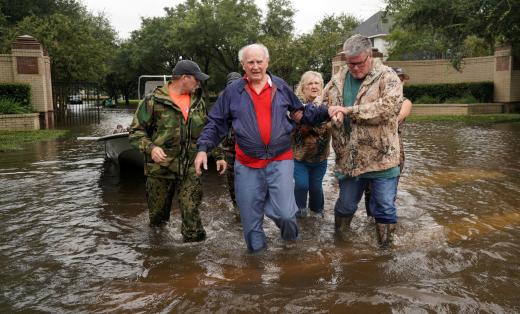Houston floods show that churches should act first, ask questions later

Joel Osteen is an easy target. His shiny image, feel good phrases and tendency towards a consumer model of Christianity have made him a target for evangelicals and liberals alike.
This week, he's come to wider attention outside the Christian bubble after the length of time it took his church – Lakewood – to open up to house victims of the flooding in Houston.
It now has been opened up and the church is joining in with the relief effort. Some have claimed that's only because of the outcry on social media.
Either way, it's been an interesting insight into the reaction of the church.
On the Today show, Osteen was quizzed about why the response took longer than expected. His answer suggested that the church should be 'precautious' because of a flood risk to the building. He then said, 'The main thing is that the city didn't ask us to become a shelter then.'
Osteen also suggested that the church was working closely with City authorities and they opened up when asked to by the city.
It's probably true that Osteen has received an unfair amount of criticism. But this statement seems pretty thin. To say that the church wasn't opened up just because the city hadn't asked yet is painting the church is merely a service provider of the state.
Actually Lakewood is one of the biggest civil society organisations in the whole of Texas, and it certainly one of the biggest churches in America. The idea that it needed to wait for a specific request from the city to open up seems rather anaemic.
Of course safety concerns need to be addressed and careful thought should go into how to respond to such an emergency. But the considerations are about how to respond, not whether to respond.
Take the recent example of the churches and other faith institutions in West London which responded with amazing speed to the Grenfell Tower fire. Amidst the complaints about the slow response of the local council, there was almost universal acclaim for the local churches which not only worked long hours and went above and beyond in their provision of services – they were also among the first on the scene.
From opening up churches and church halls, to gathering food and supplies, to providing prayer and pastoral services, the church responded with lightning speed. This meant that in the ensuing weeks, not only was the church right at the heart of the emergency response, it was also involved in advocacy for the residents of the tower, convening meetings with politicians and other leaders.
If Christians throughout history had adopted the 'well, we weren't asked so we didn't do' approach, so much of the most influential Christian social action would never have happened. The Good Samaritan didn't ask permission before embarking on his action, and neither should we.
The state didn't ask the Church to start schools, hospitals, foodbanks, debt counselling, homeless provision, drug rehab, refugee welcome programmes, childrens' and youth groups, street pastors, international aid organisations, prison ministries, anti-trafficking initiatives, the Living Wage campaign, AIDS clinics, conflict resolution centres or many, many other vital services.
The Church didn't need to be asked to begin these works because it's in our DNA to offer them. In the light of an emergency, we just do what the Church does and what the Church has always done – we roll up our sleeves and get involved. If our work is done in close collaborations with the state, then that's good, but we mustn't ever allow our response to be dictated by the state.
It's understandable that a surprise event such as the storm and floods in Houston takes people and institutions by surprise. But as churches, our orientation is towards service so we should naturally be ready to spring into action. As Christians and members of local churches, we're never just consumers of a message but volunteers for the common good, ready to get our hands dirty and to act quickly and effectively.
None of this is a direct critique of Osteen – but a much bigger issue in parts of the Church. We should always be poised to help. In the event of an emergency it's better to offer hospitality first and ask questions later.











